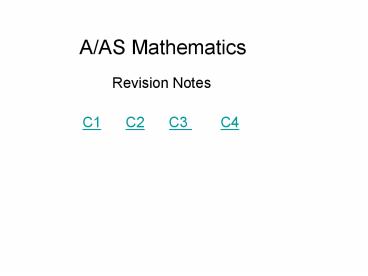AAS Mathematics - PowerPoint PPT Presentation
1 / 34
Title:
AAS Mathematics
Description:
The Trapezium Rule P2 C2. Algebra. Algebraic Long Division ... C2 The Trapezium rule. C2 Topics. where y0 = f(x0) and y1 = f(x1) etc. C2 Algebraic long division ... – PowerPoint PPT presentation
Number of Views:136
Avg rating:3.0/5.0
Title: AAS Mathematics
1
A/AS Mathematics
Revision Notes
- C1 C2 C3 C4
2
Home
C1 Topics
Calculus Differentiation P1 C1 Tangents
and Normals P1 C1 The Second Derivative P1
C1 Integration P1 C1 Algebra
Quadratic Equations P1 C1 Indices P1
C1 Surds P1 C1 Sequences and Series
P2/P2 C1/C2 Geometry Coordinate Geometry
P1 C1 Curve Sketching P2 C1
3
C1 Differentiation
C1 Topics
4
C1 Tangents and Normals
C1 Topics
Normal
Tangent
f(x)
5
C1 The Second Derivative
C1 Topics
6
C1 Integration
C1 Topics
Integration is the reverse of differentiation
7
C1 Quadratic Equations
C1 Topics
No real roots
8
C1 Indices
C1 Topics
9
C1 Surds
C1 Topics
10
C1 Sequences and Series
C1 Topics
11
C1 Coordinate Geometry
C1 Topics
12
C1 Curve Sketching
C1 Topics
Step 1 Find the Asymptotes These are lines for
which the graph is undefined (this means that the
curve does not cross the asymptotes) Step 2
Work out where the graph crosses the x and y
axis. Do this by considering what the y value is
when x0 and what the x value is when y0. Step
3 Consider what happens as x becomes very large.
Does y become very large, small, negative or
positive? Consider what happens as x becomes very
small. What happens to y? This will often give
you another asymptote.
1
0
-1
13
Home
C2 Topics
Trigonometry Sine and Cosine Formulae P1 C2
Radians P1 C2 Sin, Cos, Tan and
Identities P1/P2 C2 Calculus Uses of
Differentiation P1 C2 Area Under a Curve
P1 C2 The Trapezium Rule P2 C2 Algebra
Algebraic Long Division P1/P3 C2 The
Binomial Theorem and series P2 C2 Exponentials
and Logarithms P2 C2 Geometry Circles
P3 C2
14
C2 Sine and Cosine Formula
C2 Topics
B
c
a
C
A
b
15
C2 Radians
C2 Topics
arc
r
r
16
C2 Sin, Cos, Tan and Identities
C2 Topics
C for all angles (x) in this quadrant cosxgt0
sinxlt0 tanxlt0 A for all
angles (x) in this quadrant cosxgt0
sinxgt0 tanxgt0 S for all angles (x) in
this quadrant sinxgt0 cosxlt0
tanxlt0 T for all angles (x) in this quadrant
tanxgt0 sinxlt0 cosxlt0
A
S
C
T
17
C2 Use of Differentiation
C2 Topics
Points where gradient0
Point of inflexion
maximum
minimum
18
C2 Area under a curve
C2 Topics
y
f(x)
a
b
x
19
C2 The Trapezium rule
C2 Topics
where y0 f(x0) and
y1 f(x1) etc
20
C2 Algebraic long division
C2 Topics
21
C2 The Binomial Theorem and series
C2 Topics
22
C2 Exponentials and Logarithms
C2 Topics
23
C2 Circles
C2 Topics
24
Home
C3 Topics
Trigonometry Sec, Cosec and Cot P2 C3
Solving Trigonometric Equations P2
C3 Calculus Exponentials and Logarithms
P2 C3 The Product and Quotient Rules P3 C3
The Chain Rule P3 C3 Differentiating
Trigonometric functions P3 C3 Implicit
Differentiation P3 C3 Algebra
Functions P2 C3 Iteration
P2 C3
25
C3 Sec, Cosec and Cot
C3 Topics
26
C3 Solving Trigonometric Equations
C3 Topics
27
C3 Exponentials and Logarithms
C3 Topics
lnx
28
C3 The Product and Quotient Rules
C3 Topics
29
C3 The Chain Rule
C3 Topics
30
C3 Differentiating Trigonometric functions
C3 Topics
31
C3 Implicit Differentiation
C3 Topics
32
C3 Functions
C3 Topics
33
C3 Iterations
C3 Topics
Iteration is a way of solving equations. You
would usually use iteration when you cannot solve
the equation any other way.An iteration formula
might look like the followingxn1 2 1
xn .You are usually given a
starting value, which is called x0. If x0 3,
for example, you would substitute 3 into the
original equation where it says xn. This will
give you x1. (This is because if n 0, x1 2
1/x0 and x0 3).x1 2 1/3 2.333 333 (by
substituting in 3).To find x2, substitute the
value you found for x1. x2 2 1/(2.333 333)
2.428 571Repeat this until you get an answer to
a suitable degree of accuracy. This may be about
the 5th value for an answer correct to 3s.f. In
this example, x5 2.414...
34
Home
C4 Topics
Calculus Volumes of Revolution P2 C4
Parametric Differentiation P3 C4 Integration
by Parts P3 C4 Integration by Substitution
P3 C4 Integration Techniques P3 C4
Differential Equations P3 C4 Algebra
Partial Fractions P3 C4 The Binomial
Theorem Again P3 C4 Parametric Equations P3
C4 Geometry Vectors P3 C4































